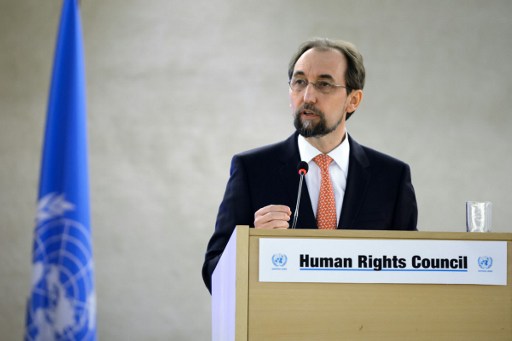Philippine President Rodrigo Duterte was among those singled out by the United Nations (UN) High Commissioner for Human Rights for speaking against and opposing human rights institutions and investigations.
High Commissioner Zeid Ra’ad Al Hussein, at the 33rd session of the Human Rights Council on Tuesday, spoke out against Duterte’s earlier comments about the UN and human rights violations allegedly perpetrated in relation to his war against drugs.
“The President of the Philippines’s statements of scorn for international human rights law display a striking lack of understanding of our human rights institutions and the principles which keep societies safe,” he said
Al Hussein pointed out that “fair and impartial rule of law is the foundation of public confidence and security” and that “Empowering police forces to shoot to kill any individual whom they claim to suspect of drug crimes, with or without evidence, undermines justice.”
“The people of the Philippines have a right to judicial institutions that are impartial, and operate under due process guarantees; and they have a right to a police force that serves justice,” he said. “I strongly encourage the Philippines to extend an invitation to the Special Rapporteur on extrajudicial, summary or arbitrary executions.”
Duterte, who is leading a war against illegal drug trade, has repeatedly criticized the United Nations as human rights groups raise concerns about drug-related killings, which have resulted in the deaths of thousands of people.
In June, he told the UN to shut up as it “can’t even solve the Middle East carnage.”
READ: Now, Duterte launches attack on UN
Months later, he again spoke out against his critics, saying he is now the President representing the Philippines.
READ: Duterte to UN: Stop, I’m the President
He also threatened to pull out from the UN but later said that it was only a joke. He gave this statement as UN experts expressed concern as the death toll from police operations and vigilante killings has continued to increase.
READ: Duterte on UN pullout: Can’t you take a joke?
In his opening statement in Geneva, Al Hussein said that governments have accused human rights institutions of interfering in the affairs of sovereign nations.
“Are human rights exclusively a national issue? Governments have the responsibility to uphold their human rights obligations and to respect the standards. But the human rights of all people, in all countries, also require – unquestionably – our collective attention,” he explained.
He said blocking international observers only raises the question, “what, precisely, are you hiding from us?”
Among the countries and areas mentioned by Al Hussein as refusing or having delays in access are Congo, Syria, Venezuela, Turkey, Ethiopia, India, Pakistan, Mozambique, Gambia, Crimea, Abkhazia, South Ossetia, Nagorno-Karabakh, China, Nepal, Uzbekistan, Armenia, Dominican Republic, Burundi, United States, Democratic People’s Republic of Korea, Iran, Belarus, Eritrea, Israel and Yemen.
“Human rights are universal, indivisible and interdependent; if States pick and choose which rights they will uphold, the entire structure is undermined,” Al Hussein said.
“Where the powerful might seek to deflect our work and evade our scrutiny, we and other human rights actors will always continue to seek the truth and stand up for the rights of all people,” he said, adding that he will continue to put focus “on countries which maintain minimal engagement with the human rights mechanisms.”
